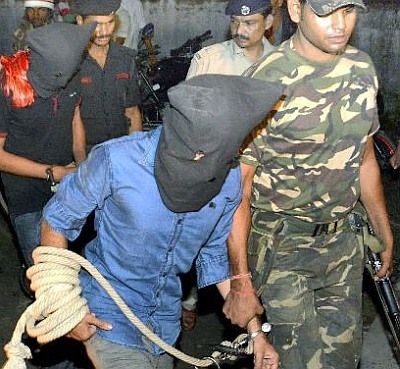 'Counter terrorism does not appear to be good guys fighting the bad ones; it is about people being picked up, detained and charged with crimes they did not commit.'
'Counter terrorism does not appear to be good guys fighting the bad ones; it is about people being picked up, detained and charged with crimes they did not commit.'
'While the Malegaon and Mecca Masjid cases are obvious examples, there are also businessmen from Kashmir accused of being terrorists, a trainee pilot charged with planning a 9/11 type attack, police informers produced at a press conference as operatives of a militant group.'
Kafkaland -- Prejudice, Law and Counterterrorism in India by Manisha Sethi, a leading activist of the Jamia Teachers Solidarity Association, documents the questionable methods by which terror cases are investigated across the country.
A lecturer at Jamia Milia Islamia, Sethi, seen, below is known as a scathing critic of the Delhi police's elite special cell. She spoke to Jyoti Punwani about the disturbing conclusions of her book.
Why did you feel the need to write this book?
The mainstream discourse on terrorism is dominated by the home ministry view. This book flows from my work with the civil rights group of university teachers where we have consistently questioned the confident narrative being served up by the investigating agencies.
The book attempts to piece together the story of counter terrorism not from the IB (Intelligence Bureau) dossiers, as has been done often, but from court records, official inquiry reports, letters sent out by accused from jail and personal interviews.
Are you saying there have been no terrorist acts by Muslims -- you have questioned the existence of the Indian Mujahideen -- or just that the investigations into these acts have been dishonest?
It is not my intention to prove or disprove the existence of organisations. My research shows that the simple black-and-white narrative of 'home grown terrorists,' starting from the Students Islamic Movement of India, leading to IM, with Harkat-ul-Jihad-al-Islami and the Lashkar-e-Tayiba thrown in for good measure, is just that: Too simplistic.
What one sees instead is a tale of abuse, violation and rampant perversion of the very idea of rule of law. As citizens it is our duty and right to hold the State accountable to the values of the Constitution.
Beyond the hyperbole in the media, counter terrorism does not appear to be good guys fighting the bad ones; it is about people being picked up, detained and charged with crimes they did not commit.
While the Malegaon and Mecca Masjid cases are obvious examples, there are also businessmen from Kashmir accused of being terrorists, a trainee pilot charged with planning a 9/11 type attack, police informers produced at a press conference as operatives of a militant group.
To call these 'dishonest investigations' would be politeness. This is manufacturing of terrorists. How does this make us safer?
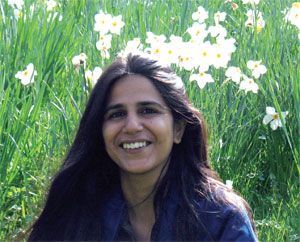 Do anti-terror laws sanction such methods? Or would the police have done the same even under ordinary laws?
Do anti-terror laws sanction such methods? Or would the police have done the same even under ordinary laws?
The police's power to inflict violence on ordinary citizens is frightening. Torture remains endemic, institutionalised and invites no repercussions. With anti-terror laws, indeed with the mere mention of terrorism, this abuse gets a veneer of legitimacy. Magistrates are more prone to granting extended police remands and even overlooking signs of torture.
A Delhi sessions court convicting the accused in the Red Fort attack case concluded that: 'Even if there is some torture or illegality committed by the police officials in the course of investigation, the same does not render the evidence inadmissible.'
Incredible though it sounds, it is possible for commentators these days to get articles advocating legalisation of torture and 'encounter' killings (euphemistically called 'controlled killings') published in the mainstream press.
Though the Unlawful Activities (Prevention) Act does not allow the admission of confession as evidence, the Maharashtra Control of Organised Crime Act does. It doesn't take much to figure out why the accused in the Malegaon case gave incriminating confessions about their involvement in the 2006 blasts.
Should the UAPA be repealed?
When the Prevention of Terroism Act was repealed in 2004, the UAPA was fortified, and several sections of POTA were included, minus the safeguards that attended POTA, at least theoretically.
The definitions of 'unlawful' and 'terrorism' are highly loose and subjective, open to interpretation according to the political or communal prejudices of the executive.
The 'new, improved' UAPA results in long periods of police custody and incarceration and denial of bail. Despite this, the UAPA is seen not a special law, but an ordinary one. It therefore does not require periodic ratification from Parliament for its continuation.
The recent amendments to the UAPA have widened the scope of terror activities, including for instance, the production and distribution of 'high quality counterfeit currency' as a terrorist offence, and not simply a financial one that was up till now dealt with under the IPC (Indian Penal Code).
The Punjab Police's partiality towards the Terrorist and Disruptive Activities (Prevention) Act's powerful provisions, or the Maharashtra police's quick recourse to MCOCA instead of ordinary criminal law, are evidence that the police favour draconian laws when they are available.
Exceptional legal regimes, which view torture and confessions indulgently, and are satisfied with a low burden of proof for terror accused, are bound to spawn a culture where rule of law is held in contempt generally. If we think we'll escape this erosion in due process unscathed, we are wrong.
By acquiescing to laws that strike at the very heart of our fundamental freedoms -- believing that they are meant for others, not us -- we are also forfeiting our liberty.
You have indicted every investigative agency, even the Intelligence Bureau. Where does the buck stop?
One did not set out to indict every agency. But case after case, in state after state, throws up a pattern. Kafkaland documents the Malegaon case and the Mumbai serial train blasts investigation, both malicious jobs conducted by the Mumbai Anti-Terrorism Squad; the Hyderabad crime branch's mass illegal detention and torture of Muslim youth in the aftermath of the Mecca Masjid blast; follows the SIMI cases from Madhya Pradesh to the Delhi special cell's endless supply of 'dreaded Pak-trained Kashmiri terrorists.'
The propensity towards frame-ups, illegal methods and brutality cannot be understood through the actions of some police officers acting on their own, but through the absolute impunity afforded by the State.
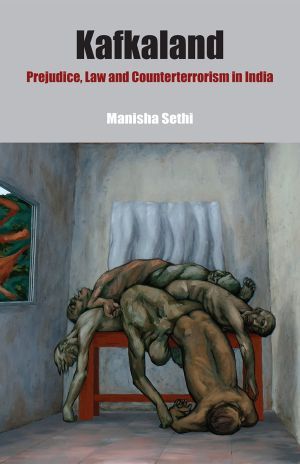 The judiciary too stands indicted in your book. But it is the courts that have acquitted most of the terror accused and passed strictures against the police.
The judiciary too stands indicted in your book. But it is the courts that have acquitted most of the terror accused and passed strictures against the police.
Yes, indeed, the low conviction rates point to the process of sifting and weighing of evidence by the judiciary. Nonetheless, what is also visible is the very disturbing trend of judicial abdication, wherein the hype surrounding 'terrorism' drowns out the principles of justice.
In the Akshardham temple attack case, the POTA court sentenced the accused to multiple life sentences and even imposed the death penalty on two, on the basis of little but confessions. It was not bothered by the brazen violation of safeguards that should have been followed while recording the confessions.
The high court confirmed the death sentences, despite the fact that letters allegedly recovered from those shot dead in the attack -- letters which the police claimed led to the accused -- were found in pristine, unspoilt condition. All it said was: 'Truth is stranger than fiction.'
In the Mumbai train blasts, the MCOCA court refused to direct the ATS to hand over the call detail records of the accused's phones, though the same were used by the ATS to seek extended custody of the accused.
Such indulgence happens even in so-called conspiracy cases where no violence is alleged. In fact, a large number of terror cases do not arise from real incidents of violence, but from hazy conspiracies, which rest on dubious seizures like magazines published by SIMI when it was still 'lawful', or simply religious literature passed off as 'jihadi' literature.
Convictions are handed down on the basis of this sparse and dubious 'evidence.' In a case in MP, the court, even while agreeing that nothing documentary had been placed before it to prove guilt, said: 'However, this does not have an adverse impact because it is not usually possible to find such proof; one cannot in fact expect or desire formal proof.' So basically the court was saying that proof was not even necessary for conviction!
You have a chapter about India moving towards an Orwellian society. Aren't you exaggerating? After all, CCTVs can prevent crime and prove innocence.
The proliferation of CCTVs is merely a symptom of the 'security metaphysic.' The hyping of terrorism as our biggest problem, increasing securitisation and technological solutions are the elements of this metaphysic.
Look at the FICCI report on national security, for example, which talks about curbing freedoms, invading privacy of citizens, and the regulation and management of society through the prism of security imperative alone.
The promotion of the idea of 'safe cities', at the cost of developing inclusive cities, tells us something. Gated communities fitted with panoptic surveillance mechanisms are meant to keep out not only the terrorist or the criminal, but also the poor. This isn't my allegation, but a self-admitted goal of consultancy firms.
It is interesting though, that the enthusiasm with which administrators embrace CCTV coverage for public spaces is absent when it comes to the Law Commission's recommendation and guidelines by several courts that CCTV cameras be installed in police stations.
While there is little credible evidence that CCTVs can bring down crime rates, studies in Europe have shown that installation of cameras in police stations can act as a deterrent against custodial violence. Many of those who spent years in jail under terror charges say that they wished there were CCTVs in the courtroom to ensure a fair trial.
The JTSA has of late been preventing illegal arrests by anti-terror cops in Delhi. Is that the way forward for others to check these cops?
No, it isn't. We can't be crusaders para-dropping wherever the agencies go. The only way forward is to ensure that agencies follow procedure. Is anyone saying that the investigators not question suspects? But surely, following established principles is not asking for the impossible?
An ATS inspector refuted the charge of illegal detention by saying that they take the suspects out for a walk every 23 hours, and thereby circumvent the legal requirement of producing the suspect before a magistrate within 24 hours!
Illegal acts by the police are not new. Is there any way police offenders can be prosecuted?
Section 197 of the CRPC (Criminal Procedure Code, which requires government sanction to prosecute public officers for offences allegedly committed in the discharge of duty) should be made inapplicable in cases where courts have drawn negative inferences against investigating agencies or hinted at malicious prosecution.
Even in cases where the courts have expressly asked for the registration of FIRs (First Information Reports) against police officers, as in the 2005 Dhaula Kuan fake encounter case, the Delhi police refused to do so. Ultimately, a stay on the directive was procured through the high court.
While the victims have to fight as individuals, the police offenders are backed by the police establishment. Where policemen have been convicted for fake encounters, it has been entirely due to the perseverance of families, who have fought a lonely battle.
The lack of an anti-torture act is also an impediment, but Article 21 should itself be the guarantor against torture and malicious prosecution. We need to develop a jurisprudence of reparations.
You have been in touch with those who have been falsely prosecuted. What is the long-term effect of these false prosecutions on them?
Most victims of malicious prosecution are left to deal with broken businesses, societal stigma, lack of skills or education if the incarceration period is lengthy, children who haven't been to school, and worst of all, severe psychiatric disorders fuelled by the sense of injustice and the constant terror that they could be arrested again arbitrarily.
Why have you named your book Kafkaland?
Kafka's writings, especially The Trial evoke the absurd, brutal and incomprehensible ways in which the State reveals itself to its citizens. The banality of this violence, the twisted morality of those who indulge in it, the cynicism of those who arrange moral foils on this violence, the labyrinths of the State where justice perpetually eludes those who don't matter to the system except perhaps as scapegoats, are the themes of this book.
What better describes this twilight zone where legality merges with illegality, and the bizarre passes for the normal, but Kafkaland?








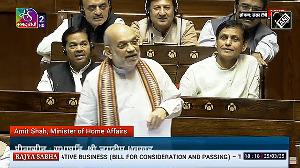
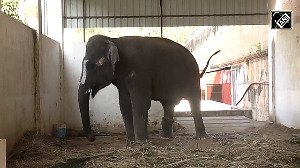

 © 2025
© 2025